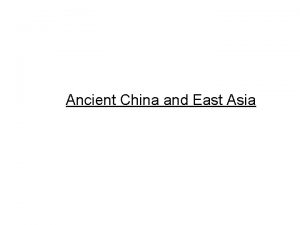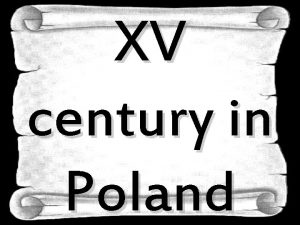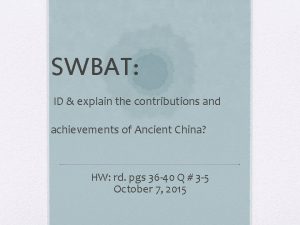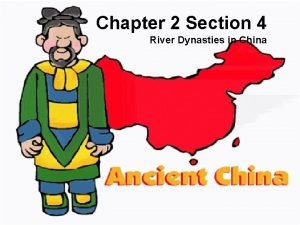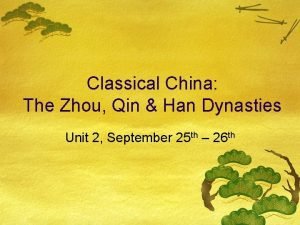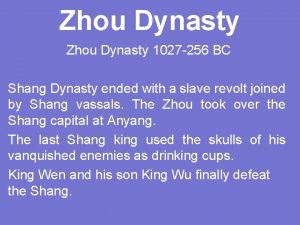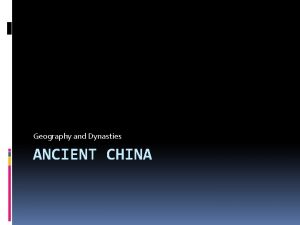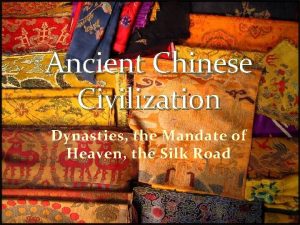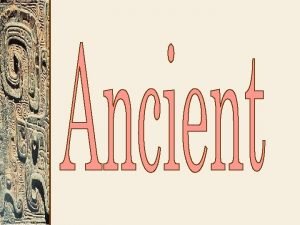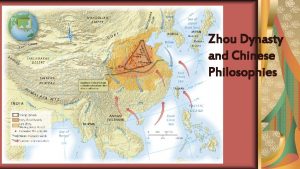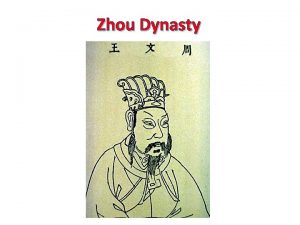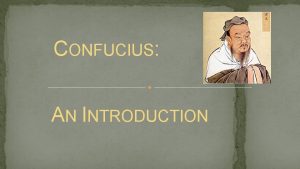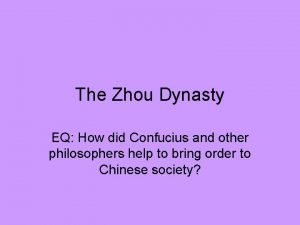Confucius The Zhou Jo Dynasty lasted for at








- Slides: 8

Confucius

• • • The Zhou (Jo) Dynasty lasted for at least eight centuries, from approximately 1027 -256 B. C. E. For the first 300 years of their reign, the Zhou kings controlled a large empire and local rulers reported to the king who had the ultimate power. In the later years the local rulers began to think of themselves as independent kings and conflict broke out. This time period is known as “the warring states period”, and it led to the decline of the Zhou.

• • China’s most influential scholar was Confucius. He was born in 551 B. C. E. and lived when the Zhou dynasty was in decline. Confucius wanted to restore order in China and hated the corruption and greed of the government officials. Confucius believed that social order, harmony, and good government could be restored in China if society was organized around five basic relationships. Of these relationships, only one is equal- friend to friend; in the other four relationships the superior person protects and provides for the inferior person, who owes them respect and honor. RULER SUBJECT FATHER SON HUSBAND WIFE OLDER BROTHER YOUNGER BROTHER FRIEND

Filial Piety • • Three of Confucius’s five relationships were based upon the family. Confucius stressed that children should practice filial piety, or respect for their parents and ancestors. According to legend, Confucius so overwhelmed people by his kindness and courtesy that almost overnight, crime vanished. Confucius did spend some time working in the government but resigned. Confucius spent the remainder of his life teaching. His students later collected his words in a book called the Analects.

The Analects are mostly a collection of parables (short stories with a moral) that teach people how to follow his teachings by example. One parable shows Confucius' opinion about bad government: • One day Confucius came upon a woman weeping at a grave. He said to her: 'You weep as if you had experienced sorrow upon sorrow, ' • The woman answered, 'It is so: my husband's father was killed here by a tiger, and my husband also; and now my son has met the same fate. ' 'Why do you not leave the place? ' asked Confucius. • On her replying, 'There is here no oppressive government. ' • He turned to his disciples and said, 'My children, remember this, --bad government is more cruel than a fierce tiger. '"

Another parable talks about Confucius' opinions on how to live life. • Confucius is questioned by several of his students: • Tzu Lu: "How should one worship ghosts and spirits? " • Confucius: "We still don't know about people, how can we learn about ghosts and spirits? " • Tzu Lu: " What about death? " • Confucius: " We don't know about life, how can we know about death? " • Tzu Kung: " Is there one rule for moral conduct? " • Confucius: "Do unto others as you would want others to do unto you. " • This Golden Rule sums up the heart of Confucianism.

Confucian Ideas about Government • • • Confucius said that education could transform a humbly born person into a gentleman. In saying this he laid the groundwork for the creation of a bureaucracy and a trained civil service. Confucianism was never a religion, but it was an ethical system based on accepted principles of right and wrong. Confucius would time and again be faced with disappointment, Confucius never found a ruler that was interested in his ideas. In fact, he would die an old man who considered himself a failure. However, after his death Confucianism did take root and today its influence can be seen throughout Chinese culture.

Other Schools of Thought Take out your chart…click here Legalist Vs. Daoists
